BERLIN – We’re not ones to just randomly interject in a conversation about a new film, with irrelevant questions about the news cycle. But in this instance, when sitting down with Salma Hayek in Berlin for the premiere of The Roads Not Taken, there was a necessity to discuss current affairs. For it was just a couple of days after Harvey Weinstein had been found guilty of rape, and Hayek was, of course, one of the brave women who spoke out against the tyrant. Here she discusses her thoughts on his verdict and what it means for the victims. She also discusses the film, naturally, and how it was to collaborate (for the first time) with Javier Bardem, who she considers to be family.
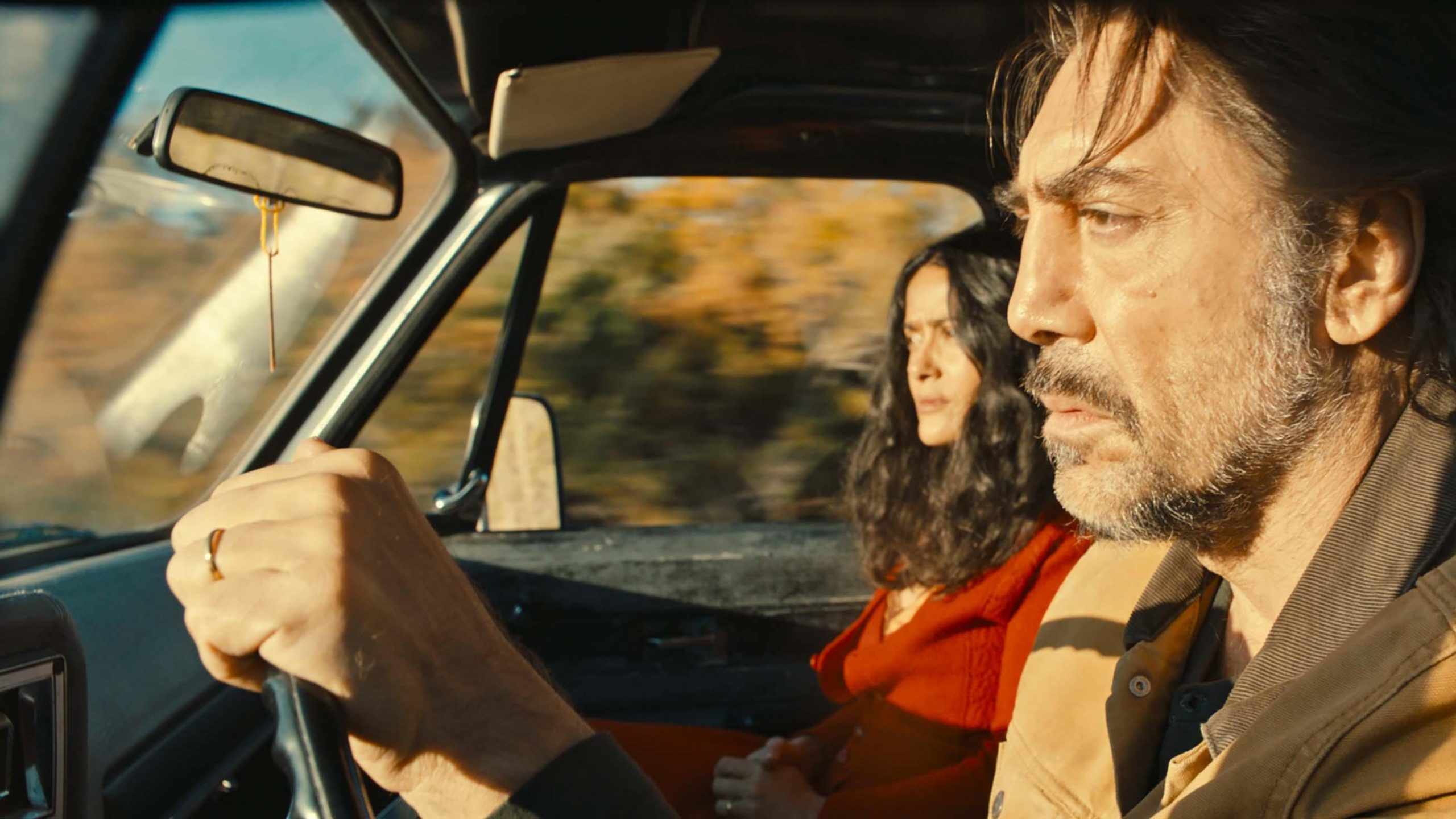
In the film we see you practising a Mexican ritual, are there any rituals you still practise?
Salma Hayek: From Mexico? Yeah, a lot of them. I actually really like to do some rituals, especially after you have kids. You try to carve the most rituals that you can, and a lot of them are like family rituals, you know. In my family the main ritual is pranks amongst each other and it was very funny because in If the French family, they don’t do as many as the Mexican. My father has taught my daughter to do a lot of pranks and it’s so sad because some of them don’t work anymore because of the stupid technology. You cannot prank people anymore, they know everything! The cooking traditions for certain days, like Christmas, and the one Mexican tradition that it’s more folk than regular tradition but we love in my family is called Mordida. It’s your birthday. We sing happy birthday, and then everybody starts saying ‘Mordida, Mordida’ and what that means is that you have to go and buy the cake and somebody behind you has to put your face in the cake. That’s the tradition. I feel my Lebanese roots strongly, and my favourite Lebanese ritual is eating.
Let’s talk about Javier Bardem. How he is as a partner? How did you work with him?
Salma Hayek: Honestly, I was terrified because… it was terrifying. When you are very good friends with someone and you’ve never worked with them, you don’t know how it’s gonna work. You don’t know how you’re going to get along with them while working. It gets tricky because he’s like my brother in law. So when you work with family, it’s really weird. And if you have a fight, then it creates tension and it expands to the family, but the most scary thing was that, for me to play the conflict of this character, I had to only do it if I knew I was going to be able to completely detach myself from me, and become someone else. So it is the problem of someone else. It has its own memories its own life. It’s cannot have anything to do with me. Same for him. And when you are doing that conflict with one person who is such an intricate part of your family.
He’s been my friend for different things, but for many years now, it has been in a family environment. So how do you go there, when you have somebody that reminds you of you? But the more beautiful thing and strange thing happened. We rehearsed a lot, a lot, a lot, a lot. And then when we showed up to the set, the first day of work, we came into the makeup trailer and we sat down, and we started, without even planning, and we both knew two things. Two relationships. One, Dolores and Diego was one through relationship. And the other one, an actor and an actress, as if they’ve never met before in their lives, and now they’re working together. It was really professional. We never talked about our lives. We never made the jokes that we make. Like you know, when you have a friend and something happens in romance, and you laugh, and nobody else understands why you’re laughing? There was none of that. And then we started and we kept our distance, we were there for each other as partners.
We helped each other out. We were creatively doing things together. I was improvising a lot. I would initiate the improvisation. He didn’t know where I was gonna take him, you know, and we played. After the movie was over, after the last take, where there was a lot of crying, we looked at each other, and we smiled.
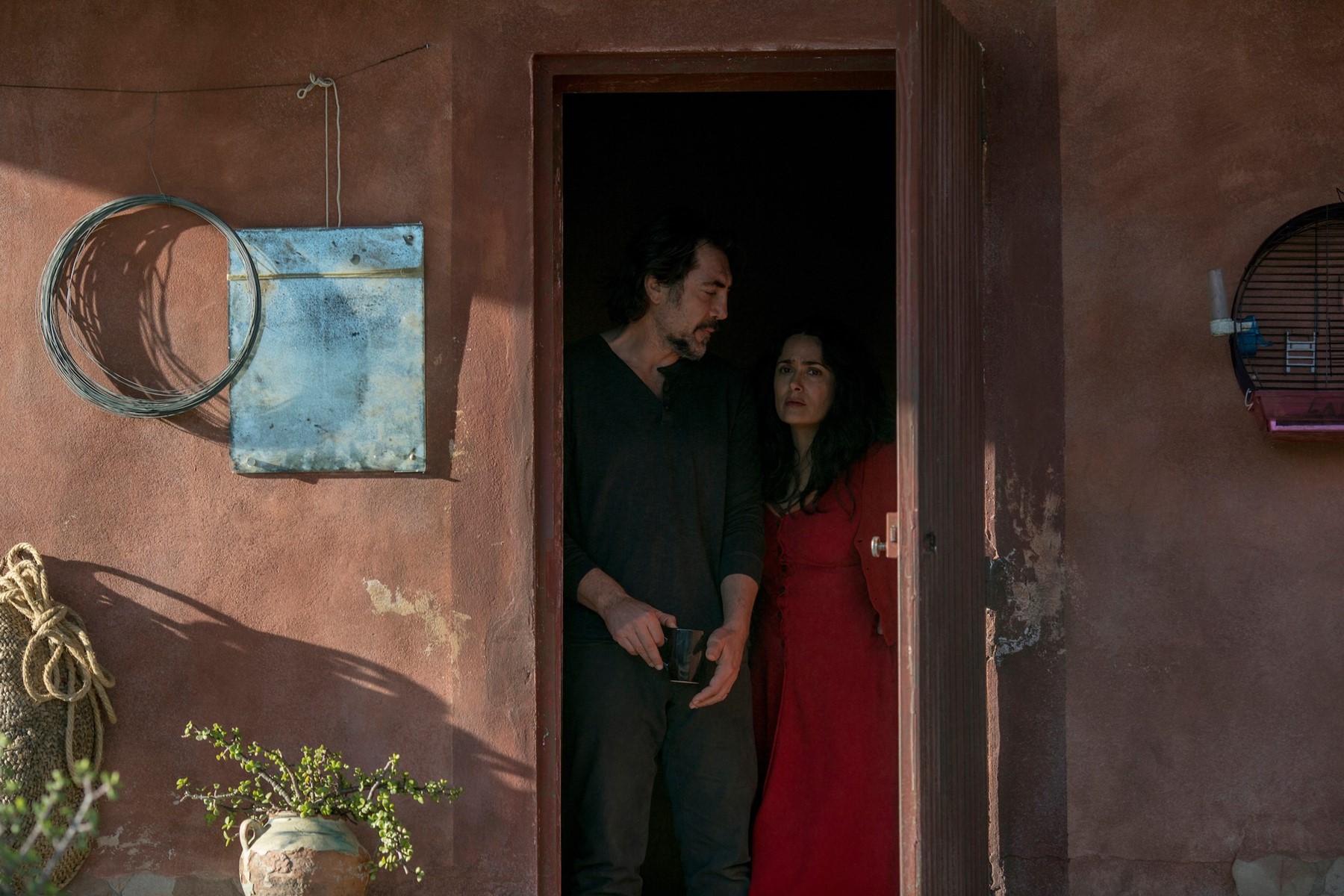
I’m sure it’s quite nice to turn up to a movie set and do two to three days, maybe one week. But your character is so integral to the story and so much of the emotional pull in the story is on that character shoulders. Was it quite hard to come in for such a short period of time and have that impact on the story?
Salma Hayek: I’ll tell you, what’s the difference – we just shot Eternals for an eternity. I just finished it. But you go super inside, especially at the beginning, but then you have two weeks off. And then when you come back for two, three days, you’re like, God, what do I do? I did something very smart though. I decorated a trailer and that helped me a lot. I would go into that space and everything would make sense again. But because on this movie, two, three days simultaneously, when I am leaving that moment it’s all in one go. Sometimes when you have to do reshoots, for example, you’ve done two, three things in between and from the other character you go to this one you’re like… what? Or sometimes when you go in a movie that has already started, everybody has their dynamic. And you come and you do a week and you go away like in The Hummingbird Project that was hard. And that was hard, because I came in, they been working for some time I work one week. Then I go with away for a month. And then I came back and again did, one week. But this one was easy.
Do you find any differences between male and female directors?
Salma Hayek: Yes. I do notice that they second guessed everything along the line. That is not a myth. And even after, the treatment is different. They have to fight in a different way. In my case, the female directors that I’ve worked with, they’re a lot more interested in character development, By the way Chloe Zhao, the director of Eternals, she’s an amazing director. So good. She’s strong. She’s Chinese.
Conversations about MeToo still go on today. When you first began nobody talked about it, how pleased are you it’s now a part of the conversation?
Salma Hayek: This conversation has really helped the cause because the last time I worked with a female director it was one that I chose, that I fought for, because I was a producer. It was 20 years ago, more than 20 years, it was Frida. But there’s a lot more work to be done. I will tell you what, I didn’t read the review from Variety, but I heard today it said the movie was like therapy for Sally for the relationship with her brother. If it was a male director, they would have said ‘what a personal piece’. Most of the reports that are criticising the film are not criticising specific things about the movie. They are criticising what Sally is doing and why she’s doing it. If it was a man, it would be bravo! He did something personal, how brave of him! You know, he went to this emotional personal place, how brave. But if it’s the woman? How dare she put her problems out there for us to look at? And we’re talking about mental health, which is quite serious. They’re still pissed off that she did a movie and made it personal about her experience and her point of view of what is it like to have someone like – and they’re pissed off! But the reviewers are men.
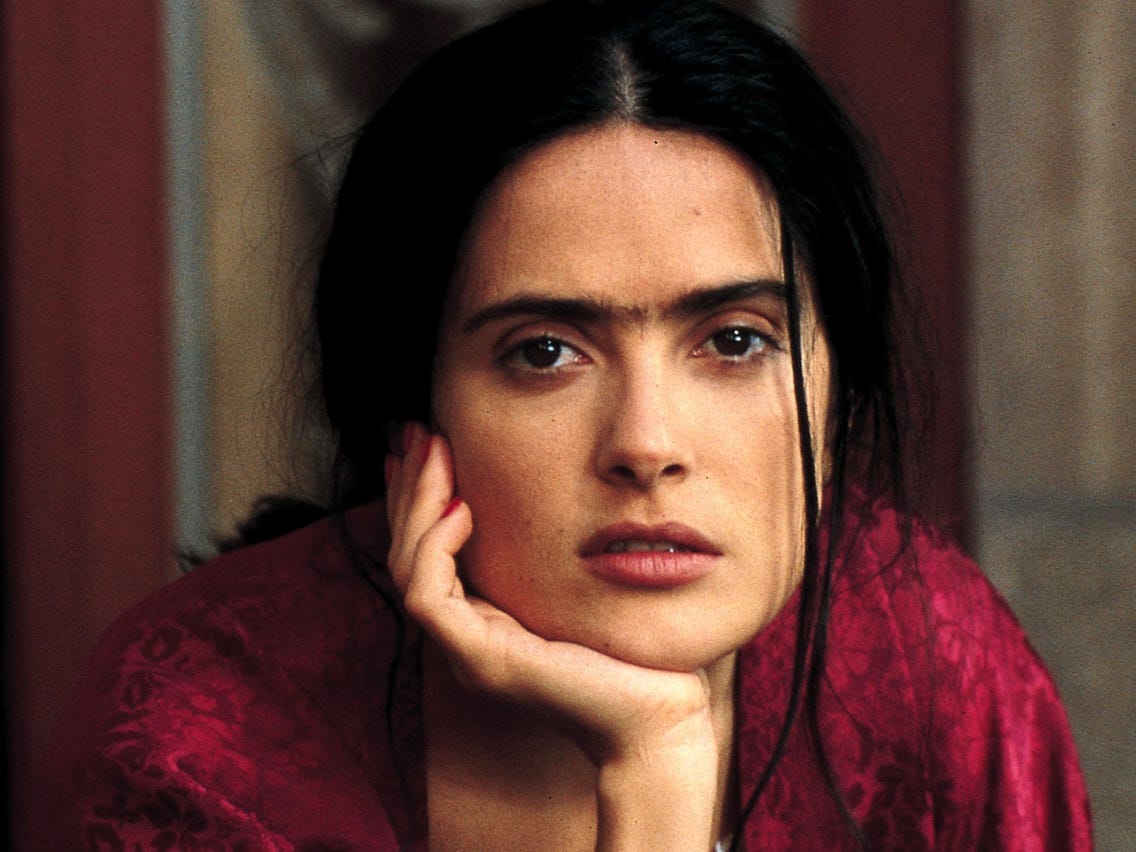
As one of the public accusers of Harvey Weinstein, are you satisfied with the verdict?
Salma Hayek: Yes, I am very pleased that there’s a consequence that is tangible for acts that were grey. I guarantee you, he’s still thinking, ‘what the hell did I do?’ And maybe as a little boy, he never understood who he was, you know. There is also a culture that says he is a good man. He’s admired for doing these things and getting away with it. It was a different time. A lot of people were confused. Now, it’s very clear. It’s not acceptable. So the men understand that it’s not right. You get consequences. And the women understand your voice is heard. Your pain, it’s important. You have the right of your dignity and it’s okay to be respected. And this is very important.
You were very brave when you published your thoughts.
Salma Hayek: And it was hard. It was hard. So but that was my closure. I thought I had a closure already before that. You know what? I did what I wanted, and he didn’t get what he wanted. And then I realised, that was very painful for me more than I thought. Then I moved on, but wait a minute, no. Oh my god, he did it to so many other women. It was very hard for me to do that. So I had closure already, so this didn’t serve as a closure but it created a lot of different feelings. It reinforced to me that I am not black and white, because I felt for his daughters, for his ex wives. And I realise that they were many Harveys that I met. And I felt different for each one of them. I felt different feelings for each one of them. But the most important thing is that I felt the most feelings, not only for the brave women that came out and took a risk and did this, but I also have a lot of feelings for the victims that would have come after. And that no longer will be. And that’s the most important thing. My response to you is not like, yeah!! It’s not it’s not that kind of thing. That’s not my sensation and my experience of the conversation that is happening today, I see it more of an opportunity for growth for everyone. I agree with the verdict. I was relieved that there was a verdict on it. But it’s a sad situation altogether. It’s a sad situation. It’s not so simplistic. And even for the woman that had to come out, and that finally they got closure, it’s a sad place to go through it. You know?
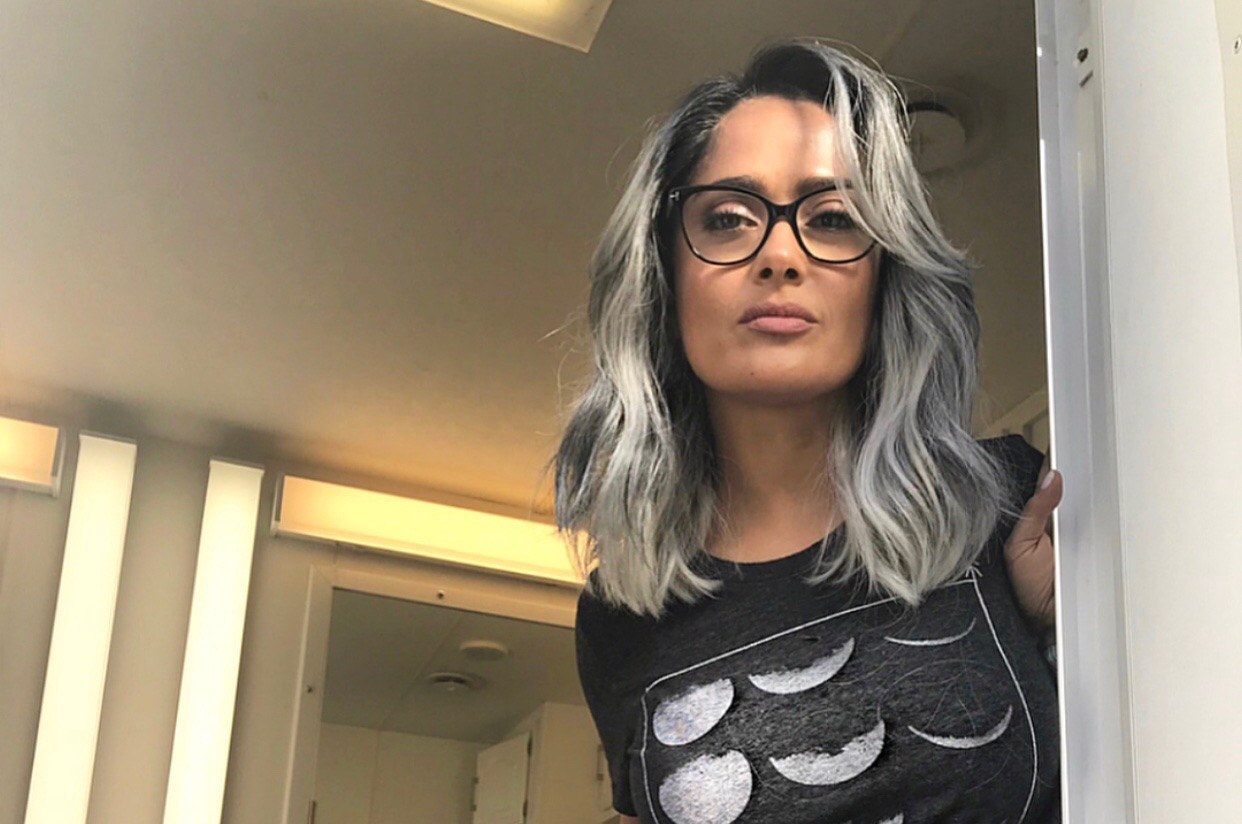
I mean, this movie is also about crossroads in life and one for you was going to America and trying to do the impossible. If you look back now, what are the other important crossroads in your life?
Salma Hayek: Well, I could have married other men. I could have married all the men that were good men, and I don’t know why I didn’t. And I kind of waited a long time and then, this one came along. And he didn’t even live in the same continent. It didn’t make any sense. Why even continue that relationship? It’s been 14 years. I started producing 15 years before anyone else, you know, it’s true. I was an activist for women when everybody looked down on me for doing it. Now it’s trendy when I started doing it, you were a stinker if you started talking about it. You know, it was the wrong look.


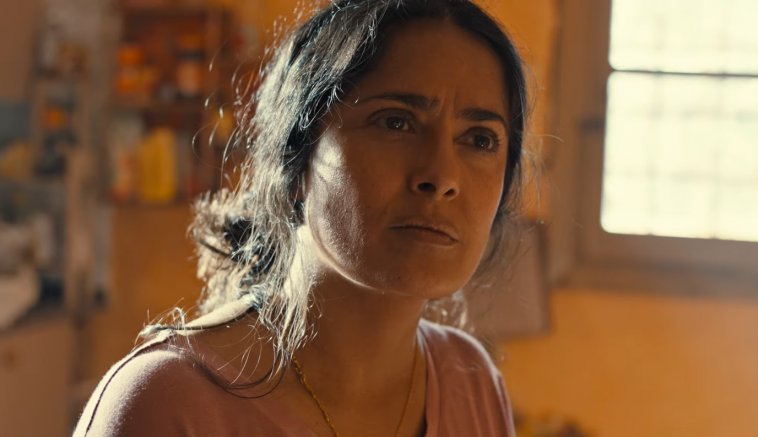

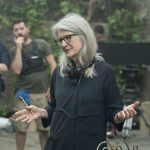















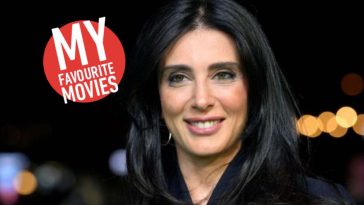






Leave a Comment